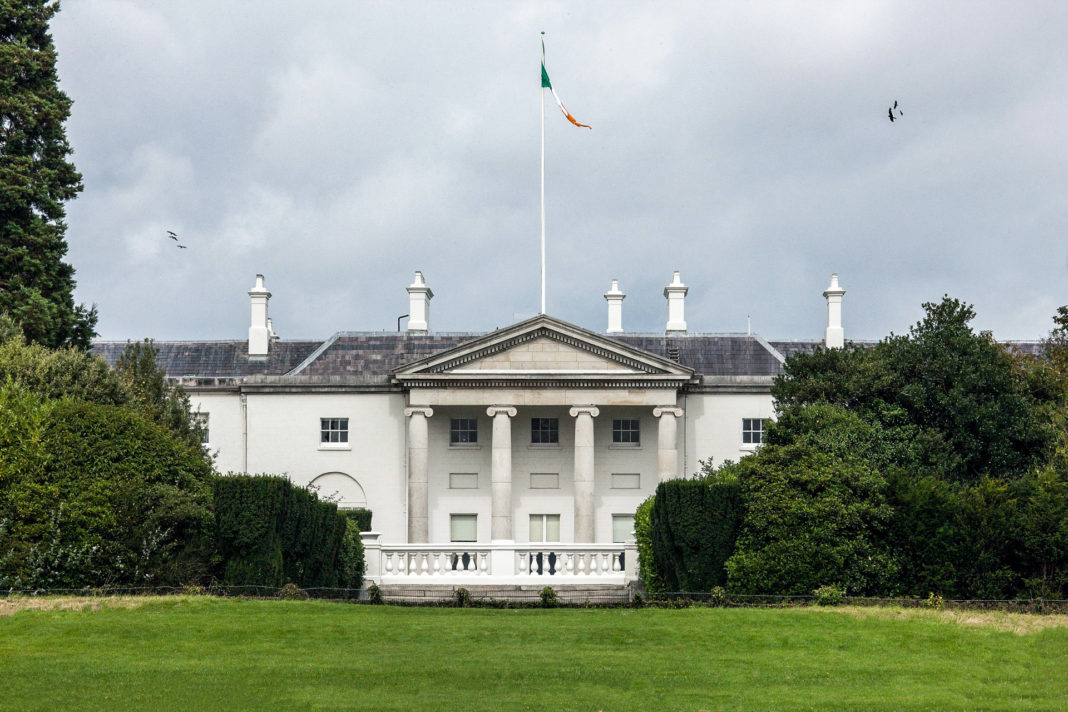During the 2011 presidential election campaign, it became blindingly obvious that only three of the seven candidates actually understood the job for which they were applying. Those candidates were the three Oireachtas dinosaurs Michael D Higgins, Gay Mitchell and David Norris. Between them at the time they had 88 years’ worth of experience in Leinster House.
This time around, some of those seeking nominations to run for the presidency seem to have done not even the bare minimum of research into what the presidency actually entails.
Some of the claims and promises made by aspiring presidential candidates border on the farcical. Patrick Feeney, a former Aer Lingus worker, wants a Luas for Galway. Musician Jimmy Smyth says he would use his presidency to fire underperforming ministers.
Gavin Duffy has stated that – if president – he would open up the presidency to Freedom of Information requests. Which sounds a noble suggestion until you remember that the scope of FoI legislation is not set by the president. If Duffy wants to change the law, he should lobby his local TD. Or run for the Dáil.
The artist Kevin Sharkey says he wants to be Ireland’s first black president, even as he campaigns on what smells strongly like an anti-immigrant platform. Which is a bit ironic, given that his own Nigerian father wouldn’t have made it to Ireland at all if we had been an anti-immigrant country. An Irexiteer, Sharkey has also called for the re-introduction of the death penalty in certain, populist, cases.
Sarah Louise Mulligan, a burlesque dancer who has said she would dress as Marilyn Monroe for Donald Trump’s upcoming visit, and self-described CEO of the website irishwholovepresidenttrump.com, has stated that – if president – she would refuse, in the wake of the recent repeal of the Eighth Amendment, to sign abortion legislation into law.
“I wouldn’t feel comfortable, even if they wanted to impeach me I wouldn’t sign it. I don’t want to see abortions in Ireland,” she said.
The journalist Gemma O’Doherty, who says she is campaigning on an anti-corruption platform, has stated: “I would not sign into law any bill that was not in the best interests of all of our people”.
Dr Jennifer Kavanagh, lecturer in Law at Waterford Institute of Technology, and author of Constitutional Law in Ireland, did the State some service on RTÉ’s Today with Sean O’Rourke last week, tackling some of the claims made by prospective candidates as to how they would behave if they were president.
Reacting specifically to Ms O’Doherty’s claim, Dr Kavanagh said: “When I saw that on Twitter, I nearly choked on my own coffee, because that has nothing to do with the role of the president.
“There’s a difference between the best interest of the people and what is constitutional, and the president, when sworn into office, declares an oath that they are the guardian of the constitution. So if it comes down to signing legislation, if they feel that there may be constitutional implications, they can summon the Council of State to see should they send (the piece of legislation) to the Supreme Court.
“That has nothing to do with the best interests of the people.”
(I should declare an interest myself here. In 2015, on the day before Christmas Eve, Gemma O’Doherty sent me a legal letter from the defamation lawyer Paul Tweed, threatening to sue me for a comment I had made on Twitter. She demanded an apology, one which she would word. I stood my ground, and heard no more.)
It might be helpful to outline what the president can and cannot do. For the people clearly not paying attention.
The president of Ireland has a ceremonial role and as such represents the State and its values. The president is the guardian of the constitution and has the power to dissolve the Dáil. As outlined above, the president cannot veto legislation adopted by the Dáil and Seanad but can, if the president believes said legislation to be unconstitutional, refer it to the Supreme Court. If the Supreme Court upholds that legislation, the president must then sign it into law.
Other than that, the president gives lovely speeches and opens community centres and the like. The president has soft power, in the moral authority which comes with being head of State, but there are strict conventions around the office, and the president is considered to be above politics. The president cannot so much as leave the country without the permission of the government.
It’s regularly said that Mary Robinson transformed the presidency from a staid, conservative, low-profile office to an often very relevant part of Irish life, and that’s a fair enough summation. Her successors Mary McAleese and Michael D Higgins have followed her lead.
The three modern presidents have done much to amplify the soft power of the presidency, but it could be argued that – notwithstanding the 1976 resignation of President Cearbhall Ó Dálaigh – the single greatest test of the presidency came during the time of Mary Robinson’s predecessor.
On the night of January 27, 1982, President Patrick Hillery fulfilled the role of guardian of the constitution arguably better than anyone before or since. Garrett Fitzgerald’s Fine Gael-Labour coalition had just lost a vote on Finance Minister John Bruton’s proposed budget and Fitzgerald travelled to the Áras to seek a dissolution of the Dáil.
Hillery then came under pressure from senior members of Fianna Fáil – including party leader Charles Haughey – to refuse a dissolution of the Dáil, thus allowing Haughey a chance to form a government without the bother of a general election. Hillery considered this interference to be gross misconduct and instructed one of his aides de camp, Captain Anthony Barber, to not put through any calls to him. Haughey threatened to end Barber’s career, and President Hillery, as Supreme Commander of the Defence Forces, put a note on the soldier’s file recording both Haughey’s threat and the fact that Barber had been acting under the president’s orders.
The presidency of Ireland is an important role, and serious job. The least those running for it could do is to read the constitution and to understand the job.
Running for the Irish presidency on an “anti-corruption” platform is akin – to borrow an Americanism – to running for dogcatcher while promising to fix military spending. It’s simply not what the job is about. Similarly, if you want the power to fire ministers, or to set immigration policy, or to expand the rail network, you’ve got to be willing to put in what the rugby boyos call “the hord yords”. Run for the Dáil, if you’re serious about the things you promise and the things you claim.
I’m not suggesting the job of president should be reserved solely for lawyers like Marys Robinson and McAleese, or for Oireachtas lifers like Michael D, but I do think we should demand aspiring candidates at least be bothered to open the “President of Ireland” page on Wikipedia.
If you want to be president for anything other than first and foremost to be the guardian of the constitution, forget it. You don’t understand the role of president and you are not the person for the job.








